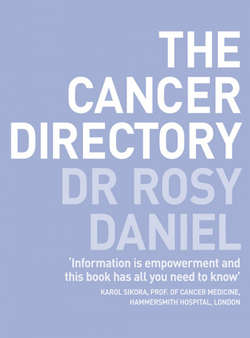Читать книгу The Cancer Directory - Dr. Daniel Rosy - Страница 67
Working with Your Doctors
ОглавлениеEstablishing the best relationship with your doctors – whether that is your GP, surgeon, oncologist or radiotherapist – will be very important for your ongoing security and peace of mind. You may be lucky and find an enlightened doctor who will help you obtain the best integrated medicine, but you may find yourself in a position where you need to gently, but firmly, inform those who are caring for you as to your values and needs. It is hard to have to do this at the point when you are so vulnerable, and would like and expect the care you get to be completely appropriate. However, as with any new relationship, unless you make your needs and feelings clearly known, it will be difficult for others to arrive at any appropriate responses.
It is important to remember that doctors are there to serve you and not the other way round! You have a right to the proper time, attention and care from your doctors and, if for any reason you do not feel comfortable with the consultant you have been referred to, you should go back to your GP and ask to be referred to someone else. We now live in a time when healthcare services are supposed to be patient-centred, so it is essential that you are satisfied with the service you are getting. If not, you need to register this with the cancer services manager in your area or hospital – otherwise, things will never improve.
Right from the start, it is important that your consultant treats you as an equal partner in your healthcare management. If you have taken on board what has been said at the very beginning of this book, you will have already realized that you are a vital member of your cancer management team. This view is backed up by leading UK oncologist Professor Karol Sikora and by the scientific evidence showing how strong a survival advantage is experienced by those who are active in their own defence.
You want to be treated as an individual, so it is useful to let the doctor know:
• how you are viewing your situation and the way you are choosing to deal with it
• how much information you want to be given
• how hard you want to fight your cancer and to what lengths you are prepared to go medically
• if you prefer not to have medical treatment or to stop the treatment you are having
• how you are reacting emotionally to your situation and how well you are coping (or not)
• which treatments (if any) you are not prepared to have
• whether you are ready emotionally and physically to start treatment.
It is important that you:
• take full charge of your situation, never allowing yourself to be railroaded into any treatment decision
• let the doctor know your current situation, values, needs or desires which may affect your treatment decisions
• ask for understanding, flexibility and help if at any time you feel too vulnerable to have treatment
• ask for the support you need
• explain (or seek professional help to explain) to your doctor the science and theory underpinning any approaches you may be using as a complement or alternative to medical treatment
• ask your doctor to be tolerant of and support the choices you are making with regards to your healthcare.
It may cheer you to know that there is an American study that proves that ‘difficult’ patients do best and survive longer. One support group even had T-shirts printed saying ‘I am a difficult patient’ to wear on hospital visits to wake up the medical team. I’ve even heard of a woman who always attended her outpatient appointments in a ballet tutu so she would be remembered and treated as an individual!
This may be too drastic a step for you, but it is a good idea to try to establish a personal rapport with the team looking after you – even if it is because you are always the one asking the searching questions or making your needs known. Humour is, of course, always the best way, and the combination of wit, cunning, being well prepared, assertive and funny is irresistible.
Your aim is to:
• obtain all the appropriate information about your situation
• be given the time to digest and react to this
• make informed consent to treatment only when you have truly understood what the treatment entails, and its potential benefits and side-effects compared with other treatments on offer
• prepare yourself well for treatment, building up your belief in the power of the treatment with visualization and affirmation
• embark upon your treatment feeling fully confident that you have picked the very best course of action for you.
Remember, too, that if you are not happy with your consultant or his opinion, you have the right to ask for a second opinion.
